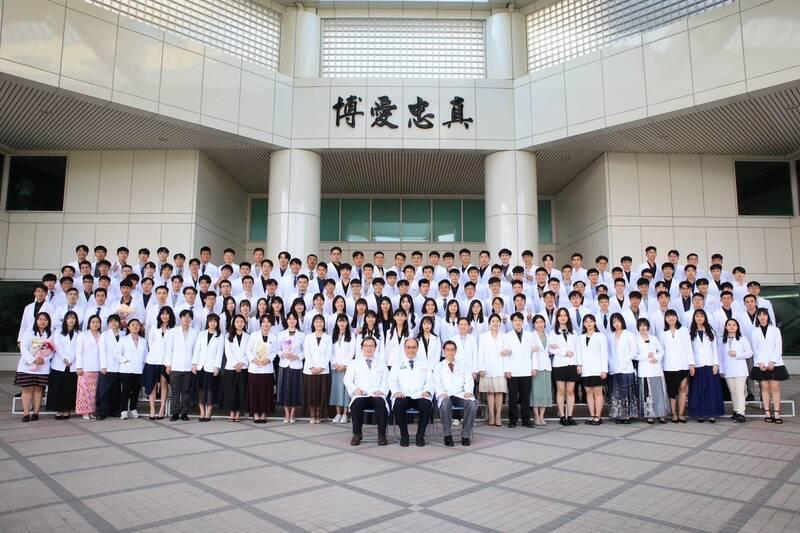Admission to military schools requires applicants to hold household registration for 20 years, the Ministry of National Defense said today in response to controversy over a Nanjing-born student’s rejection from a military-affiliated medical school.
The student yesterday posted on social media that their application to matriculate at the National Defense Medical Center was rescinded once it was revealed that they was born in Nanjing, China.
The student, who identified themselves as a third-year student at the high school affiliated with National Taiwan Normal University, said they had aspired to become an emergency physician since childhood and chose to apply to the center after it gave a talk at their high school.

Photo: Screen grab from the National Defense Medical Center's Facebook
The student said that they hold household registration in Taiwan along with a Taiwanese ID card and passport, and did not know of their birthplace until they were 15.
Admission to military schools requires applicants to hold household registration in Taiwan for 20 years, the ministry said, adding that the student is welcome to join the armed forces once that requirement is met.
The student, who was born in Nanjing, applied for household registration in 2009 while simultaneously forfeiting their Chinese citizenship, the ministry said.
According to the rule, the student would not be eligible to apply for center until they are 22.
In social media posts, the student called it “unreasonable” that they would be subject to compulsory military service, but cannot volunteer for duty.
Aspiring students must pass a selection committee review before matriculating at a military school, the ministry said.
Admission materials for military schools include nationality and household registration requirements, it said, including that candidates must be citizens, cannot hold a foreign nationality and must have household registration in Taiwan.
For those born in China, they must have held household registration in Taiwan for 20 years, the ministry added.
This case was reviewed on April 17 and the candidate was found to not meet the requirements necessary for admittance, it said.

South Korean K-pop girl group Blackpink are to make Kaohsiung the first stop on their Asia tour when they perform at Kaohsiung National Stadium on Oct. 18 and 19, the event organizer said yesterday. The upcoming performances will also make Blackpink the first girl group ever to perform twice at the stadium. It will be the group’s third visit to Taiwan to stage a concert. The last time Blackpink held a concert in the city was in March 2023. Their first concert in Taiwan was on March 3, 2019, at NTSU Arena (Linkou Arena). The group’s 2022-2023 “Born Pink” tour set a

CPBL players, cheerleaders and officials pose at a news conference in Taipei yesterday announcing the upcoming All-Star Game. This year’s CPBL All-Star Weekend is to be held at the Taipei Dome on July 19 and 20.

The Taiwan High Court yesterday upheld a lower court’s decision that ruled in favor of former president Tsai Ing-wen (蔡英文) regarding the legitimacy of her doctoral degree. The issue surrounding Tsai’s academic credentials was raised by former political talk show host Dennis Peng (彭文正) in a Facebook post in June 2019, when Tsai was seeking re-election. Peng has repeatedly accused Tsai of never completing her doctoral dissertation to get a doctoral degree in law from the London School of Economics and Political Science (LSE) in 1984. He subsequently filed a declaratory action charging that

The Hualien Branch of the High Court today sentenced the main suspect in the 2021 fatal derailment of the Taroko Express to 12 years and six months in jail in the second trial of the suspect for his role in Taiwan’s deadliest train crash. Lee Yi-hsiang (李義祥), the driver of a crane truck that fell onto the tracks and which the the Taiwan Railways Administration's (TRA) train crashed into in an accident that killed 49 people and injured 200, was sentenced to seven years and 10 months in the first trial by the Hualien District Court in 2022. Hoa Van Hao, a